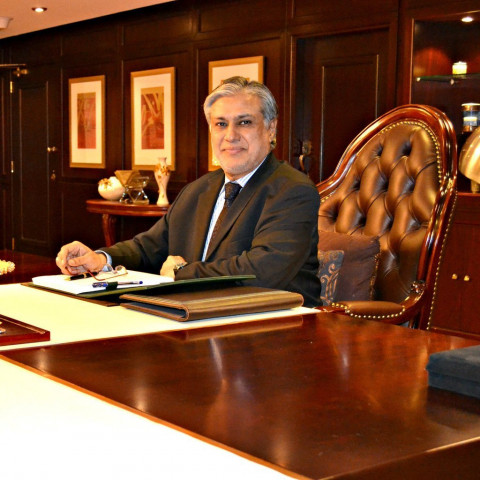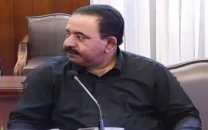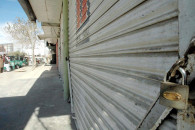Dar confession can be used against PM: SC
Hussain Nawaz’s attorney struggles to satisfy bench on money trail

Finance Minister Ishaq Dar. PHOTO: WIKIPEDIA
The government earlier faced another tough day in the apex court after the National Accountability Bureau (NAB) submitted documents relating to the Hudabiya Paper Mills case where federal Finance Minister Ishaq Dar appeared as a prosecution witness against the Sharif brothers after he opted to avail pardon.
NAB also produced Dar’s confessional statement in his own handwriting along with his application for pardon.
Panamagate case: Aitzaz hopes SC will dispense justice
The counsel for Hussain Nawaz was struggling to satisfy the five-member bench on the money trail when judges wondered how the Sharif family could have made investments worth 12 million UAE dirhams with the Qatari royal family when the Gulf Steel Mills had a total liability of 36 million dirhams and of this amount 15 million dirhams were to be paid by the Sharif family.
During the hearing, NAB’s Prosecutor-General Waqas Qadeer Dar submitted the case record, which showed that a handwritten application was submitted by the finance minister to then chairman NAB, seeking pardon on April 20, 2000.
On April 21 of the same year, the NAB chairman accepted Dar’s application and directed the investigating officer to produce him before a local magistrate for recording his statement.
On April 25, 2000, Dar recorded the confessional statement in which he claimed that the Sharif brothers used the Hudabiya Paper Mills as a cover for money laundering during late 1990s.
Dar stated that on instructions of Nawaz Sharif and Shahbaz Sharif, “I opened two foreign currency accounts in the name of Sikandara Masood Qazi and Talat Masood Qazi with foreign currency funds provided by the Sharif family in the Bank of America by signing as Sikandara Masood Qazi and Talat Masood Qazi”.
He said that all instructions to the bank in the name of these two persons were signed by him under the orders of ‘original depositors’, namely Nawaz Sharif and Shahbaz Sharif.
After going through NAB’s record, the bench observed that the pardon was granted before the confession statement as he was not nominated as an accused in the final reference.
Justice Ejaz Afzal Khan observed that although the confession could not be used against him (Dar), but it could be used against the PM.
“Once you (Ishaq Dar) gave confessional statement as an approver, it cannot be used against you, but it can be used against respondent No1 (the Prime Minister),” he said. Another judge said that if the court discarded his statement, he would become a co-accused in this scam.
Dar’s counsel Shahid Hamid also submitted that the statement had been extracted under duress and torture.
He also cited PTI chief Imran Khan’s interview in which he condemned the statement, which was recorded after torture. Justice Ejaz Afzal Khan observed that legally, no statement could be recorded under torture.
Shahid Hamid dispelled the impression that public money was involved in the Hudabiya case, because the amount in question was owed to a bank and it was duly paid back. Upon this, the bench wondered if it was not a public loss, because people deposit their money in banks.
When Dar’s counsel pointed out that Dar had been detained for 17 months after recording his statement, Justice Khosa asked whether he had approached the high court against this alleged detention. The counsel replied that a petition was filed in the Lahore High Court in this regard.
Later, the bench asked NAB’s prosecutor-general why had NAB not filed an application against LHC’s 2014 judgment, which quashed the reference against the Sharif family.
When Justice Khosa berated NAB for failing to file an appeal in this case, he stated that the decision about not to pursue the case was taken collectively.
Upon this, the bench ordered him to submit minutes of the meeting in which this decision was taken.
London flats: No satisfactory reply
Salman Akram Raja, the counsel for the Prime Minister’s sons, said he was unable to provide any information regarding the payment of 15 million dirhams in outstanding dues after the sale of the Sharif family’s shares in the Gulf Steel Mills in 1980 or how 12 million dirhams were available for investment in the real estate business of the Al-Thani family in Qatar.
Hussain says Maryam acted as his ‘signatory’
The lawyer admitted that the 45-year-old record was “not available”, but stated that outstanding dues were paid by the late Mian Sharif.
Similarly, Justice Ijazul Ahsan observed that the Sharif family obtained various loans for establishing the Gulf Steel Mills in Dubai. He asked if there was any document to show how the Sharif family secured the loan.
The lawyer again expressed his inability to do so.
Salman Akram Raja however contended that Hussain Nawaz was the beneficial owner of the London flats and Prime Minister Nawaz Sharif had no connection with them.
Justice Ejaz Afzal remarked that Salman Akram Raja will have to prove that these assets were his client’s properties and that Nawaz Sharif was not the owner of the said properties.
Published in The Express Tribune, January 31st, 2017.



















COMMENTS
Comments are moderated and generally will be posted if they are on-topic and not abusive.
For more information, please see our Comments FAQ